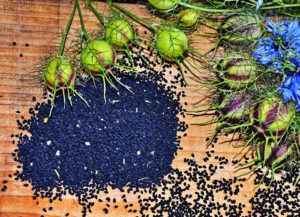Table of Contents
Black Seed Oil (Nigella sativa, Black Cumin) is an annual herb and spice belonging to the Ranunculaceae (Buttercup) family of flowering plants.

Black Seed Oil is native to the Middle East, Southern Europe and North Africa. And taking black seed oil has been used for millennia for a variety of illnesses.
It’s main active compound thymoquinone (TQ) has been shown to benefit cognitive and mental illness, cardiovascular disorders, cancer, diabetes, inflammation, and infertility.
And Black Seed Oil has been used for a variety of bacterial, fungal, parasitic and viral infections. It’s even showing promise in early studies to be effective against HIV/AIDS.[i]
Nigella Sativa oil is an acetylcholinesterase inhibitor, reduces tumor necrosis factor-α (TNf-α), and increases brain-derived neurotrophic factor (BDNF).
Supplementing with Black Seed Oil seems to modulate neuronal signaling pathways in the brain. Affecting synaptic plasticity and long-term potentiation which can help learning and memory.
Here we’ll explore how Black Seed Oil benefits your brain.
Black Seed Oil helps:
- Neurotransmitters: The compound thymohydroquinone in Black Seed Oil is one of the most potent acetylcholinesterase (AChE) inhibitors on the planet.[ii] By increasing acetylcholine, AChE inhibitors have been found to be helpful in treating apathy, autism, dementia, Alzheimer’s, schizophrenia, and Parkinson’s Disease.[iii]
- Anxiety & stress: Black Seed Oil increases L-Tryptophan and serotonin levels in the brain. Providing an antidepressant effect following repeated dosing.[iv]
- Learning & memory: Black Seed Oil has been shown in animal and human studies to support neurogenesis and long-term potentiation. Showing positive effects on learning and memory. Particularly working memory.[v]
Overview
Black Seed Oil (Nigella sativa, Black Cumin) is extracted from Nigella sativa, a plant belonging to the family Ranunculaceae (Buttercup).
It’s native to southern Europe, North Africa and Asia Minor. And known as “Black Seed” because when the seeds are exposed to air, they turn black.

Black Seed has been used for millennia as mentioned in ancient texts for a variety of health issues. Several archaeological sites in Egypt including King Tut’s tomb contained Nigella sativa seeds.
Queen Nefertiti is reported to have been a devoted user of Black Seed Oil and gave it credit for her beautiful complexion.[vi]
The earliest written reference is in the book of Isaiah where it was referred to as ketsah in Hebrew. And was used as a baking spice.[vii]
The Prophet Mohammed described the curative powers of Black Seed saying, “it has a remedy for every illness except death”.[viii]
Persian physician and philosopher Ibn Sina (Avicenna) recommended Black Seed Oil in his “Canon of Medicine” as a remedy for colds, fever, headache, toothache, skin diseases, promote wound healing, fungus, parasites, warts, and insect bites.
The main bio-active compounds in Black Seed Oil include thymoquinone (37.6%) followed by p-cymene (31.2%), α-thujene (5.6%), thymohydroquinone (3.4%), and longifolene (2.0%).[ix]
Most of the nootropic benefit of Black Seed Oil is attributed to thymoquinone (TQ).
How does Black Seed Oil work in the brain?
Black Seed Oil boosts brain health and function in several ways. But two in particular stand out.
- Black Seed Oil for attention, cognition and memory. Animal studies show that Black Seed Oil is effective for boosting memory in aged rats. And these findings were also demonstrated in human experiments.
One study by the University of Dhaka in Bangladesh recruited 40 elderly volunteers and divided them randomly into groups A and B. Group A were given 500 mg Black Seed Oil twice a day for 9 weeks. Group B received a placebo.
Neurological measures for this trial included a logical memory test, digit span test, Rey-Osterrieth complex figure test, letter cancellation test, trail making test and Stroop test.
The Rey-Osterrieth complex figure test is particularly interesting. People are asked to reproduce a complicated line drawing first by copying it freehand, and then drawing from memory.
The test permits the evaluation of things like visuospatial abilities, memory, attention, planning, working memory and executive function.
The study concluded that Black Seed Oil supplementation for 9 weeks demonstrated a significant role in enhancing attention, cognition and memory.[x]
Another study with 48 young men aged 14 – 17 who used 500 mg of Black Seed Oil per day for 4 weeks had better short-, and long-term memory and recall.[xi]
- Black Seed Oil reduces seizures (sometimes). Black Seed Oil is known to have anticonvulsive effects in ‘traditional medicine’. And because many epileptic children do not respond to modern anti-seizure medication, researchers have been conducting studies to find out if Black Seed Oil could fill this need.
One study in Iran worked with 22 patients who were divided into two groups.
In this double-blind crossover study thymoquinone was compared to standard anti-epileptic drugs over a period of 4 weeks.
The study concluded that thymoquinone, the main active compound found in Black Seed Oil has anti-epileptic effects in children with refractory seizures.[xii]
But other studies have not been as promising. One study worked with 30 intractable epileptic children and 5 healthy kids used as controls. Here again Black Seed Oil was compared to anti-epileptic drugs over the 4-week trial.
Researchers in this study found that 40-80 mg/kg/day of Black Seed Oil as add-on therapy did not alter seizure frequency or severity in intractable epileptic patients.[xiii]
But another study with 20 epileptic children aged 13 years used an aqueous extract of Black Seed Oil (40 mg/kg) 3-times per day for 4 weeks. In this study, seizure frequency was reduced significantly during treatment.[xiv]
The takeaway here for using Black Seed Oil if you are hoping to reduce the number and frequency of epileptic seizures – it may or may not work. But it doesn’t hurt to try.
How things go bad
Seems many of the cognitive ailments we suffer from today are nothing new. Our ancestors thousands of years ago were dealing with many of the same issues we face today.
As we get older, our brain chemistry and energy metabolism changes. This can happen at any age once we enter our adult years.
↓ Chronic inflammation
↓ Cardiovascular disease (high blood pressure, which affects blood clotting, atherosclerosis)
↓ Metabolic disease (diabetes, non-alcoholic liver disease)
↓ Neurodegenerative disease (anxiety, depression, Alzheimer’s, Parkinson’s)
↓ Bacterial, fungal, parasitic and viral infections
Avicenna, the famous 10th century physician in his book “The Canon of Medicine” recommended Black Seed Oil for enhancement of body’s energy and support during recovery from fatigue and dispiritedness.[xv]
What’s old is new again and we’re re-discovering the healing benefits and nootropic value of this ancient remedy for a variety of diseases.
Black Seed Oil benefits
Thymoquinone (TQ) is the primary active component of the volatile oil in Black Seed (Nigella sativa) and most of its effects and actions are related to TQ.
Black Seed Oil is anti-tumor, anti-microbial, anti-histamine, it modulates your immune system, is an anti-inflammatory and acts as an antioxidant.[xvi]
In the traditional system of medicine practices in the Arabian Gulf region, Black Seed is recommended for fever, cough, bronchitis, asthma, chronic headache, migraine, dizziness, chest congestion, obesity, diabetes, paralysis, back pain, infection, inflammation, fasting blood sugar levels, rheumatism, hypertension, and gastro issues like dyspepsia, flatulence, dysentery and diarrhea.
Over 150 clinical studies over the last 5 decades have investigated the chemical and health benefit properties of Black Seed Oil. And these studies justify the broad and traditional therapeutic value of Black Seed.
As a nootropic, studies show Black Seed Oil helps with Alzheimer’s, Parkinson’s, depression, brain inflammation, epilepsy, reduced blood flow, glial tumors, and traumatic brain injury (TBI).[xvii]
How does Black Seed Oil feel?
If you have not yet experienced the benefits of Black Seed Oil, check out some of the comments and reviews left by others who have.
Neurohackers report that using Black Seed Oil daily makes them feel better and they’ve got more energy.
Several people say using Black Seed Oil helps relieve their migraine symptoms.
A couple of people commented that Black Seed Oil gave them vivid dreams.
Some say it helps keep their allergies under control. And like Queen Nefertiti, some report their skin looks more youthful.
Black Seed Oil is said to reduce inflammation and balance hormones. Others say they get powerful relief from pain.
One person reported that she had lost 11 pounds, her joints weren’t aching, no more constipation and her sleep had improved tremendously – and she was only 1/4 of the way through the bottle. A randomized, double-blind trial of obese women who followed a low calorie diet found that the integration of black seed oil improved body composition, such as body mass index, and decreased appetites in participants.
Another long-time user of Black Seed Oil said he hadn’t been sick in over 2 years.
And several neurohackers say Black Seed Oil helps them quickly fall asleep.
Black Seed Oil Clinical Research
Black Seed Oil Boosts Memory
40 elderly volunteers were recruited by researchers at the University of Dhaka, Bangladesh. The study was conducted to see if memory improvements from Black Seed Oil with animals also worked in humans.
Half of the group were given a 500 mg Black Seed Oil capsule twice daily for 9 weeks. The other half received a placebo.
The university research team found a significant improvement in memory, attention and cognition in the group using Black Seed Oil. With no significant improvement in the placebo group.
The researchers concluded Black Seed Oil should be considered as a supplement for enhancing memory, attention and cognition.[xviii]
Black Seed Oil for Anxiety
A study with 48 healthy human male volunteers aged 14 – 17 years were recruited and split into two groups.
Group A received a 500 mg Black Seed Oil capsule once daily for four weeks. And Group B received a placebo. The volunteers were assessed for cognition using a verbal learning test, mood and anxiety. Tests were done at the beginning of the trial and after 4 weeks of supplementation.
The research team concluded that after 4 weeks of using Black Seed Oil that there was a significant mood improvement, decreased anxiety, and a boost in cognition.[xix]
Black Seed Oil Reduces Seizure Frequency
Several different drugs and drug combinations are prescribed to reduce seizures in epileptic children. But nearly 15% of children are resistant to treatment.
Black Seed Oil is known to have anticonvulsant effects which are mainly attributed to thymoquinone.
A double-blind crossover clinical study was conducted in Iran with epileptic children. 22 patients were divided into two groups with one group receiving thymoquinone and the other a placebo for 4 weeks. They each had a one week wash out period. And then the groups were switched and dosed for another 4 weeks.
The parents were happy with the results of the trial. Because the children had significantly fewer seizures when using thymoquinone.
The researchers concluded that thymoquinone has anti-epileptic effects in children with refractory seizures.[xx]
Black Seed Oil for Opiate Withdrawal
Opioid addiction is a major problem in our society. With headlines every week about the number of deaths from opiate overdose.
 The most successful treatment we have so far for quitting opiates are 12-step programs. But success rates in recovery and those ending up in relapse demonstrate how difficult it is to get off these powerful drugs.
The most successful treatment we have so far for quitting opiates are 12-step programs. But success rates in recovery and those ending up in relapse demonstrate how difficult it is to get off these powerful drugs.
But a new and novel treatment for dealing with opiate withdrawal symptoms may help.
A study was conducted in Karachi to find a non-opiate treatment for opiate withdrawal. 35 opiate addicts were recruited for this clinical trial.
While details are sketchy, the study found that 500 mg Nigella sativa significantly reduced opiate withdrawal symptoms.
The researchers concluded, “Non opioid drug Nigella sativa is effective in long-term treatment of opioid dependence. It not merely cures the opioid dependence but also cures the infections and weakness from which majority of addicts suffer.”[xxi]
Black Seed Oil Recommended Dosage
Recommended dosage of Black Seed Oil is 1 – 3 teaspoons per day.
If you’ve never used Black Seed Oil before, start with ½ a teaspoon and see how your body reacts.
Children under 11 years should only use half the adult dosage. And kids under 5 years, only a drop or two to start with.
Nigella sativa extract seeds or powder dosage is 1 – 3 grams per day.
Potency can vary between brands which can affect dosage. So check labels carefully.
Black Seed Oil Side Effects
Black Seed Oil is considered non-toxic and safe to use at recommended doses. (More is NOT better).
Black Seed Oil has a nasty taste. To me it tastes a lot like gasoline. So beware if this is your first time. And have something handy to chase it with especially if you don’t like the taste.
You should not use Black Seed Oil if you are pregnant or breastfeeding.
It’s best to check with your doctor before using Black Seed Oil, especially if you’re dealing with a chronic health condition or are currently taking medication.
Do not use Black Seed Oil if you have a bleeding disorder or plan on doing surgery of any kind.
If you have low blood pressure Black Seed Oil could make this condition worse by causing slow blood clotting.
And too much Black Seed Oil (more than the recommended dosage) could cause liver or kidney damage.
On your skin, Black Seed Oil may cause a rash or hives. Best to do a small patch test before using a regular dose.
Type of Black Seed Oil to Buy
Black Seed Oil is easily found in most health food stores and vitamin shops worldwide. You can get Black Seed Oil in a bottle, or Black Seed Oil capsules. Or Black Seed extract as a powder. The Oil version in a bottle is most common.
Always go for organic Black Seed Oil to ensure you are not getting any toxic pesticides or herbicides contaminating your oil.
And select Black Seed Oil that comes in a dark amber glass bottle which helps prevent it from going rancid.
Choose an oil that is cold-pressed because other methods of extraction involve high heat. Which can damage the beneficial compounds and fatty acids in the oil. And you’ll end up with Black Seed Oil that’s useless.
I recommend and use Click for Zhou Nutrition Black Seed Oil (Amazon) because it’s GelCaps. It works and has good reviews.
And if you want to try and can stand the taste of pure oil I recommend Prime Natural Organic Black Seed Oil. (Amazon)
Nootropics Expert Recommendation
 Black Seed Oil 1 – 3 teaspoons per day
Black Seed Oil 1 – 3 teaspoons per day
I recommend using Black Seed Oil as a nootropic supplement.
Your body does not make Black Seed Oil on its own. So to get its benefits you must take it as a nootropic supplement.
Black Seed Oil is especially helpful for those dealing with stress and anxiety. Because it affects the GABA pathway in your brain which provides its anxiolytic benefit.[xxii]
Recent research shows depression may be caused by inflammation. Black Seed Oil may reduce symptoms of depression because it decreases levels of inflammatory markers like interleukin-4 (IL-4), interleukin-6 (IL-6), interleukin-13 (IL-13) and tumor necrosis factor alpha (TNF-a).[xxiii]
Black Seed Oil can increase learning and memory within 20 weeks of consistent, daily dosing.
If you’ve tried other meds to reduce seizures with no luck, try Black Seed Oil next. Because it’s been shown to be effective with some types of epilepsy.
And two decades of research shows Black Seed Oil may be effective in suppressing tumor development, growth, and metastasis for a wide range of brain tumors. Including glial tumors which cannot be treated by modern medicine.
Black Seed Oil is a powerful but ancient nootropic supplement. If you’ve tried everything else including the latest mainstream medicine has to offer and have had no luck, try Black Seed Oil.
You can safely take up to 3 teaspoons of Black Seed Oil daily if needed. Split into smaller doses 2 – 3 times during your day. But do NOT exceed 3 teaspoons.
I recommend and use Click for Zhou Nutrition Black Seed Oil (Amazon).
And if you want to try and can stand the taste of pure oil I recommend Prime Natural Organic Black Seed Oil. (Amazon)










Join The Discussion - 147 comments
Sven
October 17, 2020
Black seed oil + Rhodiola Rosea + NAC + L-theanine + B-complex. What are your thoughts on this stack David? I read somewhere on the internet that black seed oil + rhodiola rosea is not recommended and could cause serotonin syndrome because they both affect serotonin and dopamine levels? Is this true or nonsense? Do rhodiola and black seed oil interact with one another? And if it is true, would you throw out rhodiola or black seed oil?
David Tomen
October 17, 2020
Sven, Black Seed Oil increases L-Tryptophan and serotonin levels in the brain. And Rhodiola Rosea acts like a MAOI which may also affect serotonin levels.
I’ve not seen anywhere that they are contraindicated. Black Seed Oil increases serotonin. This animal study (https://www.ncbi.nlm.nih.gov/pmc/articles/PMC3951226/) showed that it raised tryptophan levels in the rat’s brains. Tryptophan is a direct precursor to serotonin.
Bottom-line is I don’t think it can cause Serotonin Syndrome. But I have no proof and haven’t seen any proof that it does.
Sven
October 18, 2020
So would you advise taking them together? I plan on starting using black seed oil as a replacement for ashwagandha because I have thyroid issues and side effects like insomnia, lowered libido and increased appetite with ashwagandha (such a shame since it is giving me such an awesome anti-anxiety effects). So is black seed oil a good alternative since it also affects GABA? Can you give a recommendation to what would be the most similar non-synthetic nootropic like ashwagandha? Thank you!
David Tomen
October 18, 2020
Sven, scroll up to The Research section “Black Seed Oil for anxiety” where it’s been proven in a study to help anxiety. It does help some with anxiety. But as good as Ashwagandha? Impossible to say unless you try it. Lemon Balm may also be a good option for you if Black Seed Oil doesn’t work.
Sven
October 19, 2020
I’ve read that Lemon Balm could possibly counter hyperthyroidism effects of ashwagandha if two are combined together (https://old.reddit.com/r/Nootropics/comments/7on7x6/possible_large_benefits_of_using_ashwagandha_and/). What are your thoughts on that David?
David Tomen
October 20, 2020
Sven, interesting theory and seems logical. The only way to find out is to try it.
Mo Koehn
September 29, 2020
Dear David,
I came off Anti-depressives with the recommended slow tapering. Sept 2017 last dose. Was taken anyhow such a low dose 15 mg. due to anxiety as a result of mobbing.
Still have withdrawal symptoms – hyperarousal and pain in vagus nerve.
Can black seed oil help me? I started on this sinc
Can your book help me?
PS I loved your youtube on black seed oil.
David Tomen
September 29, 2020
Mo, coming off of antidepressants some say is far worse than detoxing off of opiates. The companies that sell these drugs neglect to tell you that these drugs can permanently alter things like gene expression and how ion channels work in your brain.
It’s unlikely Black Seed Oil can help. But at this point it’s likely worth trying. Don’t you think? And sorry, but Head First has nothing on detoxing from antidepressants.
eamonn sych
August 29, 2020
Can you take black seed oil with concerta/ritalin? Have you looked at polygala at all? Looks like a very interesting herb.
David Tomen
August 29, 2020
Eamonn, I’ve used Black Seed Oil with Ritalin with no problem. And I am not aware of any contraindication.
I have not done any research on Polygala tenuifolia but it does look like an interesting nootropic. It’s on my list “to do”.
Jay
June 26, 2020
Black seed can’t be that good if I look at the picture of the 3 gears in the man’s head. Get it? If not take more black seed:)
David Tomen
June 27, 2020
Jay, Black Seed Oil lubricated the gears which resulted in an “aha” moment and the exclamation mark.
Owais
April 6, 2020
Hi David,
Can black seed oil and DHA 1000mg be taken together?
David Tomen
April 23, 2020
Yes
Serge
March 31, 2020
Hello David
Thanks hoe many teaspon to consume per day to control the prolactin levels?
David Tomen
April 23, 2020
Serge, likely 3 teaspoons per day.
Serge
March 31, 2020
Hallo David
Can black seed oil lower prolactin levels?
David Tomen
March 31, 2020
Serge, there is some evidence that Black Seed Oil helps control prolactin levels. Including several animal studies like this one: http://www.veterinarypaper.com/pdf/2018/vol3issue4/PartA/3-3-11-284.pdf
Serge
March 16, 2020
Hello David
Black seed oil have effect on ED
David Tomen
March 16, 2020
Serge, not as well as things like L-Arginine and L-Citrulline will help ED. Black Seed Oil does help blood flow but not to the extend as those supplements will help.